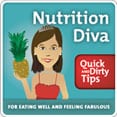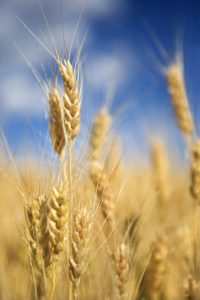 Although diet plays a role in the development and progression of breast cancer, it’s a fairly secondary one. Still, it’s the factor that we have the most control over. Even though no diet or food can prevent breast cancer, if certain habits can reduce our risk, why wouldn’t we adopt them? Learn more in this week’s podcast.
Although diet plays a role in the development and progression of breast cancer, it’s a fairly secondary one. Still, it’s the factor that we have the most control over. Even though no diet or food can prevent breast cancer, if certain habits can reduce our risk, why wouldn’t we adopt them? Learn more in this week’s podcast.
Category: Ask Monica
Your nutrition questions answered
Which Foods are Highest in Pesticides?
 I’ve talked in the past about the “Dirty Dozen,” those fruits and vegetables with the highest pesticide residues. But a listener wants to know how much pesticide exposure we get from other foods like grains or dairy. I’ve got the scoop on pesticides in this week’s show. Read or listen to it here.
I’ve talked in the past about the “Dirty Dozen,” those fruits and vegetables with the highest pesticide residues. But a listener wants to know how much pesticide exposure we get from other foods like grains or dairy. I’ve got the scoop on pesticides in this week’s show. Read or listen to it here.
Do Grains Decrease Colon Cancer Risk?

Q. After doing some research, I have been trying to reduce my intake of grains. But the big thing in the news this week is a new study finding that fiber from grains reduces the risk of colon cancer and that fiber from fruits and veggies doesn’t have the same effect. Have you looked at this new research? Do you still recommend reducing grains?
A. Just to be clear, I’m not anti-grain. Although I suspect that most Americans consume an excessive amount of grain products (especially refined grains), and I believe that grains are not essential to a healthy diet, I still think that a healthy diet can include grains (especially whole grains).
I have, however, questioned the dogma on the “benefits of whole grains” on the basis that the research doesn’t really distinguish between the benefits of adding whole grains and the benefits of reducing refined grains. (The two virtually always go hand in hand.)
Does this new study change my position? Not really. Continue reading “Do Grains Decrease Colon Cancer Risk?”
Does Cooking in Cast Iron Add Iron to Foods?

Marni writes: “I have heard that cooking in cast-iron pans can increase the iron content of some foods. Is this a safe source of iron and are there any foods that I shouldn’t cook in cast-iron?
Get the scoop on cooking in cast iron in this week’s podcast. Read or listen to it here.
Is MSG Bad for You? Part 2 of 2.
 The FDA and EU consider MSG to be a harmless flavor enhancer; critics claim it’s a dangerous toxin. Who’s right? Last week, I explained what MSG is, how it acts in the body, how it’s used in the food supply. This week, I take a closer look at charges that MSG causes headaches (“Chinese Restaurant Syndrome”), neurological damage, or has harmful effects on insulin, diabetes risk, or even obesity. Read or listen to Part 2 here.
The FDA and EU consider MSG to be a harmless flavor enhancer; critics claim it’s a dangerous toxin. Who’s right? Last week, I explained what MSG is, how it acts in the body, how it’s used in the food supply. This week, I take a closer look at charges that MSG causes headaches (“Chinese Restaurant Syndrome”), neurological damage, or has harmful effects on insulin, diabetes risk, or even obesity. Read or listen to Part 2 here.
Is MSG Safe? (Part 1 of 2)
 The FDA and EU consider MSG to be a harmless flavor enhancer; critics claim it’s a dangerous toxin. Who’s right? In this article, I take a look at what MSG is, how it acts in the body, how it’s used in the food supply. In Part 2 , I’ll take a closer look at charges that MSG causes headaches (“Chinese Restaurant Syndrome”), neurological damage, or has harmful effects on insulin, diabetes risk, or even obesity. Read or listen to Part 1 here.
The FDA and EU consider MSG to be a harmless flavor enhancer; critics claim it’s a dangerous toxin. Who’s right? In this article, I take a look at what MSG is, how it acts in the body, how it’s used in the food supply. In Part 2 , I’ll take a closer look at charges that MSG causes headaches (“Chinese Restaurant Syndrome”), neurological damage, or has harmful effects on insulin, diabetes risk, or even obesity. Read or listen to Part 1 here.
What Are Nightshades and Do You Need to Avoid Them?
 People with arthritis are sometimes advised to avoid tomatoes, peppers, and eggplants (the so-called “nightshade” plants) because they are said to cause inflammation. But this advice really only applies to certain people. Find out how to tell if you’re one of them in this week’s show.
People with arthritis are sometimes advised to avoid tomatoes, peppers, and eggplants (the so-called “nightshade” plants) because they are said to cause inflammation. But this advice really only applies to certain people. Find out how to tell if you’re one of them in this week’s show.
Is Goat Milk Better for You than Cows Milk?
In recent years, goat milk has gone from a fairly rare specialty item to one that’s available in most large grocery stores. And whenever you see an exotic, costly alternative to a mainstream food item, it’s easy to assume that it must be either better—or better for you. In this week’s show, I take a closer look at the differences between goat milk and cow milk and what nutritional advantages, if any, goat milk might offer.
